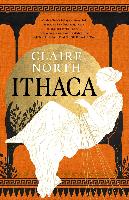Book review: Ithaca by Claire North
 I’ve never read The Odyssey, but for my degree I had to study James Joyce’s Ulysses, which involved a couple of lectures detailing how it follows the structure of Homer’s classic. I’ve intended ever since to give The Odyssey a go but 20 years have passed now. I suspect the closest I will come is modern reworks, including those that tell just part of the story. And the best I’ve read so far is Ithaca by Claire North.
I’ve never read The Odyssey, but for my degree I had to study James Joyce’s Ulysses, which involved a couple of lectures detailing how it follows the structure of Homer’s classic. I’ve intended ever since to give The Odyssey a go but 20 years have passed now. I suspect the closest I will come is modern reworks, including those that tell just part of the story. And the best I’ve read so far is Ithaca by Claire North.
Strictly, you could argue this isn’t so much a retelling as filling in the gaps. Penelope is the star of the story, while her absent husband Odysseus is the background character often mentioned but never seen. Penelope runs the island of Ithaca quietly, hiding her wisdom behind her official (male) advisers, turning to her unofficial band of (female) advisers in secret.
As the novel opens, 18 years have passed since Odysseus left, taking with him every man and boy of Ithaca who could wield a weapon. Survivors of the war with Troy started returning to other Greek islands years ago. Penelope and her advisers know her husband left Troy safely but they also know something must have gone very wrong on the journey. And the rest of Greece has noticed that Ithaca is missing its king.
“A silence settles. In this silence there should be more small talk. Penelope, for all her wits, is not very good at small talk. Being permitted to grieve profoundly for an absent husband has been something of a social blessing these past 18 years, an acceptable shroud for quiet. But in this darkened room, there are certain rituals that must be followed, certain patterns of behaviour.”
For two years, suitors have filled the palace, feasting every night, making offers for Penelope’s hand. She keeps them at bay, quietly insisting that her husband lives. But she knows time is running out. She will soon be forced to choose a husband or risk losing Ithaca to a power-hungry neighbour.
Her son Telemachus is 18, technically a man, but he does not have what it takes to rule the land yet. His efforts at taking charge are clumsy and short-lived, the outbursts of a sulky teenager who has never known his father as a person, only as a legend looming large.
“Telemachus never quite finishes his sentences. When he is introduced to people, it is as ‘Odysseus’s son, Telemachus’. His father’s name is always put first, and it is as if this quirk of language has infected Telemachus’s own voice, so that he can’t quite see his way through to the end of any meaningful sentence that might have something of himself in it.”
What we soon see is that Ithaca isn’t lacking a ruler, it’s being run very capably by Penelope. But she knows Greece won’t take kindly to a queen regent so she must keep her string-pulling secret. And it’s working, until a pirate raid that may be more than just a pirate raid signals that the balance is tipping.
In this tale, gods and goddesses are real, as are their supernatural exploits. In true classical style, Ithaca is narrated by a goddess, Hera. She’s not supposed to be watching Penelope, this island is Artemis’s domain, but she finds herself fascinated. Is she interested enough to intervene on Penelope’s behalf?
This is truly a tale of badass women. While men eat, drink, bicker and posture, the women get on with what needs to be done. It’s also really funny, with a biting dry wit that made me laugh out loud.
“The great men of Ithaca are far too busy doing more poetry-worthy stuff, such as losing battles or stealing other men’s mistresses. Indeed, Penelope could not have expressed a notion more awkward in that minute than if she had stood up and proclaimed: ‘Also, I bleed from my private parts every moon or so and giggled the first time I saw Odysseus’s willy.’ “
I loved this book and I am eager to read its sequels. House of Odysseus is out in hardback and a third book is on its way.
Published 2022 by Orbit.
Source: I bought this at Falmouth Bookseller on a long weekend in Cornwall last year.
One Comments
Comments are closed.